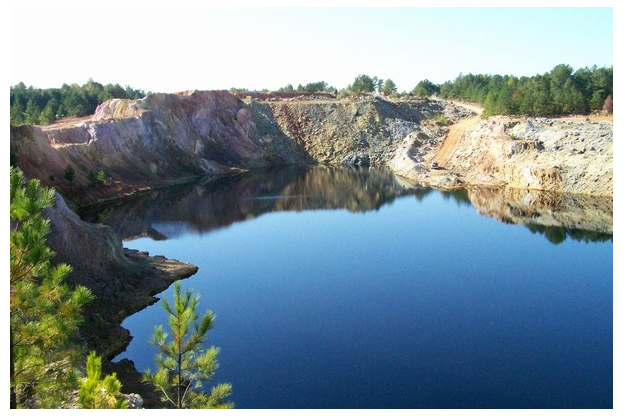

From a gleam in a miner’s eye
To Superfund site in eighteen short years
This is quick work, even for a mining company. In spite of the mine owner’s name, Nevada Goldfields, Inc., this abandoned mine is in South Carolina. It operated from 1991 to 1995; Nevada Goldfields declared bankruptcy in 1999, and the EPA declared the site a Superfund site in 2009.
The plucky miners at the Barite Hill mine apparently didn’t find much gold in the four years that the mine was in operation, but they did hit one kind of jackpot:
Site investigations found contamination in ground water, soil, sediment and surface water that could potentially harm people in the area. Contamination resulted from operations at the site. Contaminants of concern include, arsenic, cadmium, chromium, copper, lead, mercury, nickel, selenium, silver, zinc and cyanide.
I guess somebody did put up a sign telling people downstream not to eat the fish, probably until, well, forever. Swell.
And gosh, the miners meant so well. They even had a spiffy reverse osmosis water treatment system by Siemans. I can’t resist quoting Siemans about the system:
Challenge
In order to expand operations and maintain a water balance in South Carolina’s wet climate, Nevada Goldfields’ Barite Hills [sic] gold mining operation required a treatment plant to handle its wastewater. At this mining site, the company extracts gold from soil using a high pH cyanide leaching solution. The process generated large volumes of cyanide and metal laden wastewater, which they had been storing on-site. Nevada Goldfields needed to reduce the levels of many heavy metals to the part per billion (ppb) range.
Solution
Nevada Goldfields investigated several technologies that would reduce the metals to acceptable limits. Treatability testing showed that a combination of reverse osmosis and ion exchange reduced metal levels to meet the required limits for all parameters of concern. Installation includes a full-scale, 25 gpm system [take a look at the hole in the ground above and tell me that 25 gpm is adequate] with two multimedia filters to remove metals and solids to less than 1 mg/L, two carbon adsorption filters to remove organic contaminants and finally, reverse osmosis and ion exchange equipment to remove salts, metals and dissolved solids before the water is discharged into the environment. The reverse osmosis concentrate is rerouted to holding ponds at the site.
Results
The system has been operating since December 1994. Siemens Water Technologies, formerly USFilter, and Nevada Goldfields worked together to value engineer [the whole deal was “value engineered” all right] the treatment system, thus providing the necessary procurement flexibility to minimize capital expenditures. To best meet its financial objectives, Nevada Goldfields purchased the multimedia filtration and carbon adsorption equipment. They lease the reverse osmosis unit and buy the ion exchange canister services from Siemens.
Gee, I wonder what Siemans did when Nevada Goldfields quit making lease payments on the “reverse osmosis unit” after the mine came a cropper? And note that the system wasn’t even installed until shortly before the mine stopped operation. The mine “stored” the “large volumes” of cyanide-laced water “on-site” before then.
If you read the EPA website at the link above, you’ll see that the EPA doesn’t even have a handle on how big the problem is yet.
But be sure not to eat the sunnies, sonny!
This entire preposterous and lamentable affair has a lesson for Minnesota, too. Minnesota mine operators are supposed to provide financial assurances, “satisfactory to the Commissioner of the Department of Natural Resources,” that disasters like Barite Hill won’t happen and that they will clean up their sites. But you can be sure that PolyMet and Twin Metals Minnesota (each of whom have foreign ownership) will tell the Commish, Hey, don’t worry; we’ve got this. You don’t need a bond. We won’t go bankrupt; we promise.
A little free legal advice Commissioner: get a guaranty from the ultimate parent corporations of the operators. If they balk, well, that tells you something, doesn’t it?
Thanks for your feedback. If we like what you have to say, it may appear in a future post of reader reactions.


